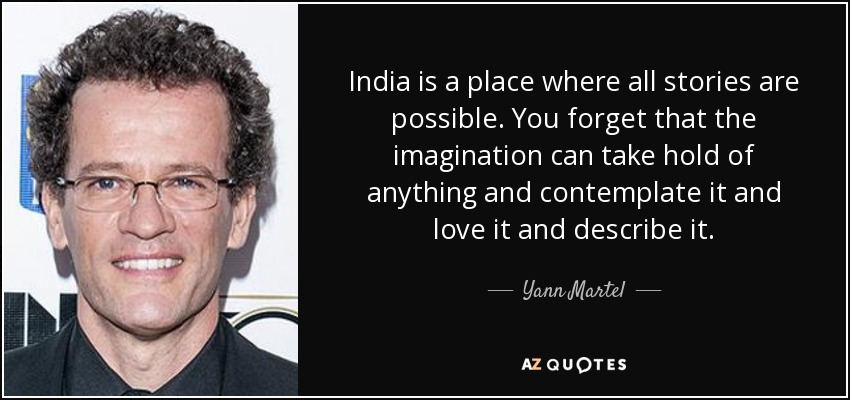Kolkata, Feb 10 (IANS) Yann Martel, the Canadian author of the Man Booker Prize-winning “Life of Pi”, finds India diverse, dazzling and a place with a great tradition of storytelling and says the country may very well be the backdrop of one of his future novels.
In a freewheeling interview with IANS, Martel, who first travelled to the Indian sub-continent in 1996 with two little-known books against his name, talked about how the country altered his perceptions about faith and deeply inspired him to use the “animal symbolism” in his writings.
“India is so diverse, alive, varied and true to itself. It is so colourful and lively that it was literally quiet shocking for me when I first came here. You go to other countries… they are beautiful in a more sedate way. There is nothing sedate about India.
“Maybe I would use India as a backdrop of my story. That would depend on my coming back here again. I still haven’t seen much of the country yet. May be I will read the Ramayana one day and feel that I have got to write this book on India,” said Martel, who was in the city for the Tata Steel Kolkata Literary Meet.
“There is tremendous tradition of story-telling in India, both among the native Indians and the city dwellers. Even foreign writers have come to India and written novels on this country. So definitely there is something extremely stimulating about India,” he noted.
The author, whose revered novel “Life of Pi” sold over 13 million copies around the world and was transformed into an Academy Award winning film by Ang Lee in 2012, said his visit to the sub-continent helped him embark upon a new journey as a writer.
“For me India was the country of all the Gods and all the animals. I come from a country like Canada which does not have many Gods as it is mostly a secular country. Also there are not a lot of animals in the public places,” Martel said, adding that he was taken aback by the presence of animals in Hindu mythology.
“It made me look into two things that I never really considered much in life, religion and animals.
“It inspired me to use the animal symbolizing the divine. In my earlier novels animals were just minor characters. But during …Pi, I realised that animals can be really strong characters. We seem to confine animals to the world of children’s literature but to me their symbolic potential to me is infinite. They act as a rich vehicle for a story teller,” he explained.
“Life of Pi” featured a tiger, an orangutang, a hyena and a zebra while Martel’s next novel “Beatrice & Virgil” features a monkey and a donkey at the centre of the plot.
The author, however, said he has no plans to write screenplays despite the massive success of the “Life of Pi” as a film.
“I like writing novels. Writing screenplays are a small part of something bigger, whereas writing novel is a thing in itself,” he said.
Martel, who grew up in a largely secular society in Canada, noted that his life’s journey transformed him into a “believer in divinity” but said he has “mixed feelings” about organised religions as they have done “terrible things” to humanity.
“I have faith in religion in a very broader sense. It is more like I believe in a divine power. But if we talk about organised religion, be it any religion, it has done terrible things. Every religion is sexist. Religions like Christianity has been deeply patriarchal, anti-semitic and homophobic,” he said.
“But faith in not just the existence of divinity but in anything is a key mechanism in life. The most unique and key emotion to human being is love and one has to have the faith to be in love,” Martel said.
“In a way faith helped me to achieve what I have achieved. I have realised that once you have faith, you trust that your life makes sense. You believe that there are adversities because you are being tested. Faith gives your life a moral framework, a narrative, a ritual.”





